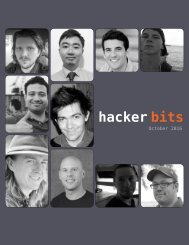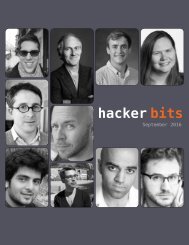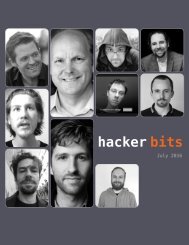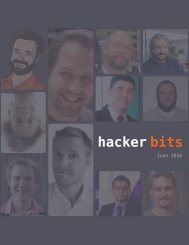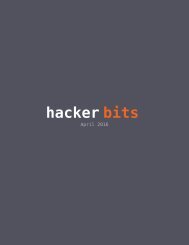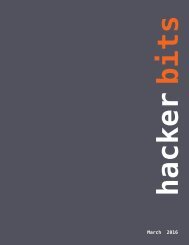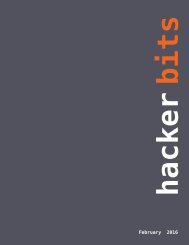Hacker Bits, August 2016
HACKER BITS is the monthly magazine that gives you the hottest technology stories crowdsourced by the readers of Hacker News. We select from the top voted stories and publish them in an easy-to-read magazine format. Get HACKER BITS delivered to your inbox every month! For more, visit https://hackerbits.com/2016-08.
HACKER BITS is the monthly magazine that gives you the hottest technology stories crowdsourced by the readers of Hacker News. We select from the top voted stories and publish them in an easy-to-read magazine format.
Get HACKER BITS delivered to your inbox every month! For more, visit https://hackerbits.com/2016-08.
Create successful ePaper yourself
Turn your PDF publications into a flip-book with our unique Google optimized e-Paper software.
We made men sound like women and<br />
women sound like men, and looked<br />
at how that affected their interview<br />
performance.<br />
Interviewing.io is a platform<br />
where people can practice<br />
technical interviewing anonymously<br />
and in the process, find<br />
jobs based on their interview<br />
performance rather than their<br />
resumes.<br />
Since we started, we’ve<br />
amassed data from thousands<br />
of technical interviews, and in<br />
this blog, we routinely share<br />
some of the surprising stuff<br />
we’ve learned. In this post, I’ll<br />
talk about what happened when<br />
we built real-time voice masking<br />
to investigate the magnitude of<br />
bias against women in technical<br />
interviews.<br />
In short, we made men<br />
sound like women and women<br />
sound like men, and looked at<br />
how that affected their interview<br />
performance. We also looked at<br />
what happened when women did<br />
poorly in interviews, how drastically<br />
that differed from men’s<br />
behavior, and why that difference<br />
matters for the thorny<br />
issue of the gender gap in tech.<br />
The setup<br />
When an interviewer and an<br />
interviewee match on our platform,<br />
they meet in a collaborative<br />
coding environment with<br />
voice, text chat, and a whiteboard<br />
and jump right into a<br />
technical question.<br />
Interview questions on the<br />
platform tend to fall into the category<br />
of what you’d encounter<br />
at a phone screen for a backend<br />
software engineering role,<br />
and interviewers typically come<br />
from a mix of large companies<br />
like Google, Facebook, Twitch,<br />
and Yelp, as well as engineering-focused<br />
startups like Asana,<br />
Mattermark, and others.<br />
After every interview, interviewers<br />
rate interviewees on a<br />
few different dimensions.<br />
As you can see, we ask the<br />
interviewer if they would advance<br />
their interviewee to the<br />
next round. We also ask about a<br />
few different aspects of interview<br />
performance using a 1-4<br />
scale. On our platform, a score<br />
of 3 or above is generally considered<br />
good.<br />
Women historically<br />
haven’t performed as<br />
well as men…<br />
One of the big motivators to<br />
think about voice masking was<br />
the increasingly uncomfortable<br />
disparity in interview performance<br />
on the platform between<br />
Feedback form for interviewers<br />
hacker bits<br />
55








